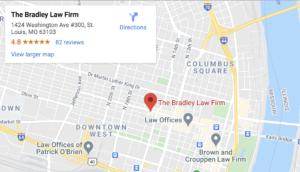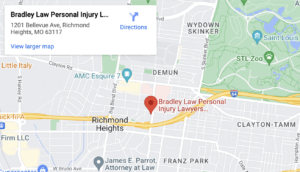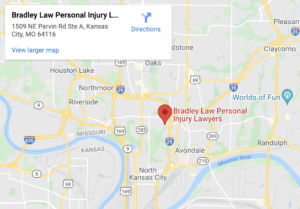
Just about everyone has heard of medical malpractice, where someone sues a doctor or a hospital for providing incompetent medical services. What many people don’t realize is that there is such a thing as legal malpractice. It works a lot like medical malpractice in that you can sue a lawyer for providing incompetent legal services in the context of a personal injury claim.
If your lawsuit is successful, you can win money damages. Alternatively, you could negotiate a private settlement with the lawyer or with the lawyer’s malpractice insurance carrier. You can also report your lawyer to the Missouri Bar for disciplinary action.
Table of Contents
What Is Legal Malpractice?
The definition of legal malpractice is derived from the four elements of a negligence claim. To win a claim for legal malpractice, you must prove that:
- Your lawyer owed you a duty of care. Your lawyer definitely owes you a duty of care once you hire them and sign a written agreement stating the terms of the representation. A free initial consultation, or a casual conversation at a bar, might not be enough to establish a duty of care.
- Your lawyer breached their duty of care to you. The lawyer’s breach of their duty of care must be serious. Ordinarily, a missed phone call or an act or omission of similar significance will not trigger malpractice liability.
- You must have suffered harm. That might mean you lost your claim, or it might mean that you ended up with less money than you deserved.
- Your lawyer’s breach of duty is what caused the harm you suffered. If you would have lost your case anyway, you have no claim for legal malpractice.
In many legal malpractice cases, the plaintiff (the victim) shoulders the burden of proving two cases in one. They must win their medical malpractice against their lawyer by providing that they would have won their personal injury case but for the malpractice of their lawyer.
Acts and Omissions That Add Up to Legal Malpractice
Unfortunately, there are few clear-cut cases of legal malpractice. What if your lawyer slept through part of the trial? Is it malpractice if your lawyer refuses to return your phone calls? It isn’t always clear. Following are some relatively clear-cut examples of legal malpractice:
- Stealing money that you entrusted to them.
- Negligently mishandling money that you entrusted to them.
- Missing the statute of limitations deadline to file a lawsuit.
- Failing to meet pretrial deadlines.
- Accepting a low settlement offer from the other side without obtaining your permission first.
- Refusing a generous settlement offer that you instructed them to accept.
- Drafting a settlement agreement (that both parties signed) with loopholes that allow the other side to avoid paying the agreed-upon compensation.
- Failing to inform you of important legal options in time for you to exercise them.
- Inadequate knowledge of the law as it relates to your claim.
- Failing to properly apply the law to the facts of your case.
- Failing to enlist the help of expert witnesses when the case clearly requires such expertise. Medical malpractice claims almost always use expert witnesses, for example.
- Failing to interview critical eyewitnesses.
- Failing to address a medical lien.
- Filing a lawsuit against the wrong party.
- Inadequate use of the pretrial discovery process, resulting in lost opportunities to access valuable evidence.
- Misplacing or deleting critical files, photographic evidence, or documentation.
- Refusing to respond to the other side’s discovery requests (during pretrial discovery).
- Failing to properly check for conflicts of interest before accepting your offer of representation. This only matters if a conflict of interest subsequently appears.
- Seriously disobeying your instructions for the conduct of the case. Ultimately, you have the right to make all major case decisions.
- Delegating work to a junior lawyer or to a non-lawyer without properly supervising them.
- Failing to address child support liens on settlements.
- Violating their confidentiality obligation to you by revealing details of your case without your explicit or implicit permission. This could include delegating aspects of your case to other law firms without your permission.
- Making a mathematical mistake when calculating your damages.
This is a short list, believe it or not. These are a thousand other mistakes your lawyer could make that would constitute legal malpractice.
Behavior That Doesn’t Add Up to Legal Malpractice
Some of the following behavior is inherently offensive, and some of it is not. Either way, it doesn’t normally add up to legal malpractice.
- Maintaining a close friendship with the opposing attorney. This is completely normal in the legal profession unless the lawyers discuss confidential aspects of your case.
- Obnoxious or rude behavior toward you, professional colleagues, or other people involved in the case.
- Failure to promptly respond to your attempts at communication, assuming no serious harm results.
- Failure to frequently update you on the status of your case.
- Coming to a hearing or a trial unprepared – again, if no serious harm results.
It bears repeating that you won’t have a legal malpractice case no matter how serious your lawyer’s misconduct is unless you can show that the misconduct harmed your interests significantly.
Settling Your Legal Malpractice Claim Out of Court
The lawyer you are claiming against will probably want to avoid the bad publicity a trial almost guarantees. Likewise, you probably prefer the cheaper, simpler option of a private settlement.
Yes, you need the credible threat of a lawsuit to motivate the other side to negotiate with you. You might not need to actually carry out this threat, however. Just hire a good legal malpractice lawyer, thoroughly investigate, assemble persuasive evidence, and demand a settlement.
Odds are you won’t have to carry out this threat. Even if you do have to resort to a lawsuit, however, you can still reach a private settlement anytime before the final verdict.
Seeking Professional Discipline Against Your Lawyer
If the lawyer’s misconduct was serious enough, it might violate the Missouri Rules of Professional Conduct regardless of whether you suffered harm. You might file a complaint with the Missouri Bar. If your lawyer is held responsible, the resulting professional discipline could range anywhere from a reprimand to permanent disbarment or some intermediate sanction.
You might not receive any compensation this way, but you probably will ensure that your lawyer doesn’t harm anyone else in the future. The Missouri Bar does maintain a Client Security Fund that sometimes reimburses clients harmed by an unethical lawyer. But because this fund paid out only about $300,000 in 2022, don’t count on any reimbursement.
You’re Going To Need an Experienced Attorney for Help With a Legal Malpractice Claim
In most cases, you need a lawyer to help you file a personal injury claim against a defendant. But what do you do when even the defendant is a lawyer? Hire your own lawyer, of course. call (314) 400-0000 to schedule your free consultation with a Missouri personal injury attorney at Bradley Law Personal Injury Lawyers.
What chance do you have without one? Realistically, it might be difficult for you to find a lawyer willing to represent you in a lawsuit against another lawyer. It should be worth the extra effort, however.




